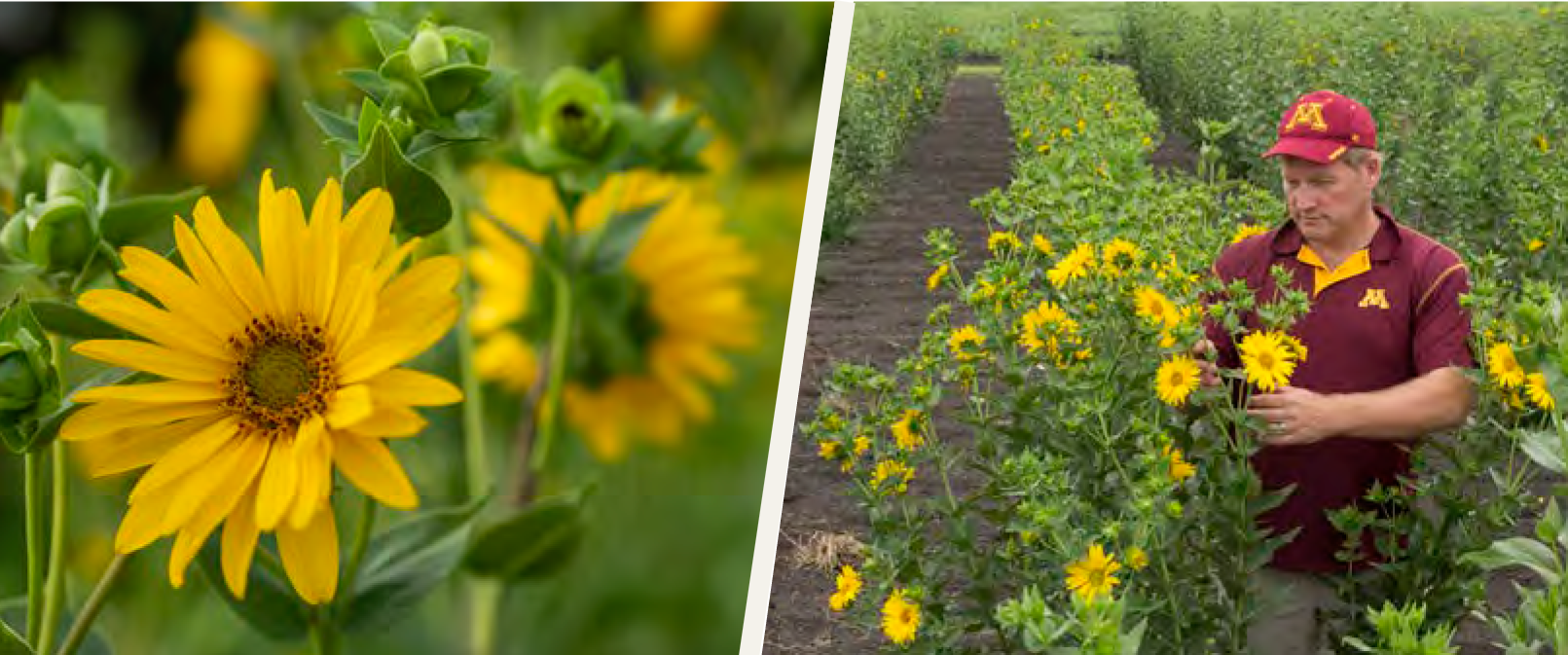University of Minnesota initiative devotes research and education efforts into a wide range of perennial crops.


The Forever Green Initiative (FGI) is a crop research platform housed in the University of Minnesota College of Food, Agricultural and Natural Resource Sciences. FGI acts as a bridge between researchers, farmers, and other partners. Their transdisciplinary and cross-sector efforts have three major parts:
1. Research and development to create new “continuous living cover” crops and cropping systems and build the agricultural knowledge and food science applications they need.
2. Learning and experimentation to create connections amongst change agents.
3. Communication with key industry partners, including the U.S. Department of Agriculture, legislators, and other policy liaisons.
FGI brings together a range of public and private experts, leaders, farmers, and businesses to test and implement tangible opportunities to combat climate change, protect water, build soil health, and prioritize social well-being in communities across Minnesota and the Upper Midwest.
At the university, fifteen different teams support the advancement of the crops in the FGI portfolio. This includes Kernza®; a new winter barley; winter oilseeds that can be double cropped with soy; agroforestry with a current focus on hazelnuts and elderberry; winter flax and peas; perennial sunflowers (silphium); and alfalfa, hairy vetch, and other cover crops. Such crops and cropping systems are part of a goal to provide Continuous Living Cover on the soil—a mission shared by FGI’s partners including Green Lands Blue Waters, also housed at UMN.
Keeping roots in the ground year-round reduces water runoff, wind and water erosion, adds organic matter, sequesters more carbon, and helps retain soil and nutrients. These crops can bring a new class of agricultural products to market, broadly aligned with shifting consumer values. As such, they offer significant potential to deliver new economic and social opportunities for farmers and rural communities. FGI is deeply committed to sustainable commercialization of these new crops and cropping systems in ways that deliver across the ‘triple bottom line.’
“This work is not exclusive to university researchers. We work with growers across Minnesota and really, the globe. We work with food businesses, government leadership, culinary professionals, and organizations such as AGC to build the web necessary to bring new crops to viability,” said Connie Carlson. Her role with Forever Green is in market development, and she’s also the statewide sustainable ag and food systems co-director for University of Minnesota Extension’s Regional Sustainable Development Partnerships (RSDP).

“We are on the entrepreneurial edge of system change efforts,” explained Colin Cureton, FGI Director of Adoption and Scaling (pictured, top image). The innovations that Forever Green coordinates are analogous to the development of renewable energy; support for this field must be multi-faceted, not just research and development followed by quick adoption in an existing framework.
The Forever Green Initiative was formed officially in 2010, but builds on concepts laid out in the early 1990’s. A small but mighty commercialization team, Connie and Colin, were hired in 2019. Tessa Peters began working with The Land Institute at the same time, and the three work closely to support the commercial rollout of Kernza and other emerging perennial crops. Forever Green is also developing winter annual cropping systems, and improved common cover crops.

Bringing any new crop to market, Colin notes, is risky. Most new crops fail because there’s so much at stake, and so many aspects to manage, from planting and harvest considerations to developing processing infrastructure, clearing regulatory hurdles, market and product development, and consumer education. Consider hemp, which was legalized for production in 2018 at the national level. Farmers raced to plant acres, but many did not connect to buyers prior to planting; they couldn’t, because production facilities were not yet built. The boom/bust cycle is just one of the many challenges of realistically approaching the possibility of a new crop.
In order to manage risk with Kernza, Colin, Connie, and Tessa have been tightly connected to stakeholders across the supply chain, vetting farmers and food businesses in advance of participation to ensure this new crop and cropping system doesn't fail. With support from the State of MN, FGI also developed and manages a team of technical assistance providers and is launching an environmental benefit payment and risk-sharing pilot program to support Kernza production in Minnesota. The framework they are building for how to do this is a critical piece of the puzzle.
AGC is all about this kind of network building, and we’re grateful and excited to be part of the work being done at FGI. To learn more, follow along with major initiatives they're deeply involved in like KernzaCAP, IPREFER (pennycress), and the Upper Midwest Hazelnut Development Initiative, and stay in touch with their progress via their website and YouTube channel at the links below.
